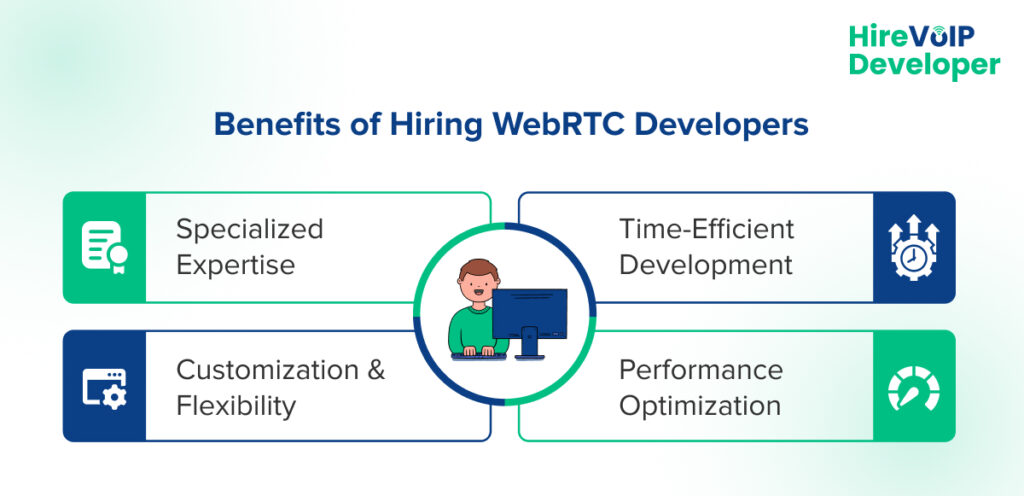Real-time communication (RTC) has become a crucial aspect of modern digital communication, especially as businesses increasingly shift to remote work, online collaboration, and customer engagement. Whether video calls, intelligent chats, or instant messaging, users expect seamless and immediate connectivity across various platforms.
WebRTC is an open-source platform that allows websites and web applications to communicate in real-time, including audio and video, without an intermediary. Traditional systems require plugins or native clients to stay effective, whereas a WebRTC platform eliminates the need for plugins or native clients.
Key Features of WebRTC
With increasing competition, businesses are trying hard to meet user demand with instantaneous interactions, and this is where WebRTC streamlining features come into play.
- Peer-to-peer Communication – WebRTC enables direct communication between users’ devices, reducing latency and jittering. This peer-to-peer connectivity enhances the speed and quality of communication and reduces load, which can lower costs and improve scalability.
- Real-Time Data Streaming – WebRTC facilitates real-time audio, video, and data transmission, crucial for video conferencing, telehealth, and gaming applications. The ability to instantly send and receive data without delays creates smoother, more natural interactions.
- Cross-Platform Support – WebRTC is built to work across multiple platforms, including web browsers (Chrome, Firefox, Safari) and mobile devices (iOS, Android), making it accessible to a broad audience. Developers can create solutions that work consistently across different environments.
- Security – WebRTC comprises advanced security features, such as end-to-end encryption by default. This ensures that data shared between users is protected from threats, making it suitable for sensitive applications like financial services, telemedicine, and secure messaging.
Why Real-Time Communication is Vital for Modern Applications?
Today’s digital users expect instant interaction. Whether attending a virtual meeting, connecting while playing, or providing customer chat support, they want communication to be immediate and responsive. Lag or delays can result in a poor user experience and loss of loyal customers.
- Video Conferencing and Collaboration Tools – Solutions like Zoom, Google Meet, and Microsoft Teams rely on RTC to provide high-quality video and audio calls. WebRTC easily integrates these features into custom platforms for businesses of every sphere and size.
- Entertainment and Broadcasting – From entertainment to e-commerce, real-time broadcasting is essential for engaging audiences during events, webinars, or live product demos.
- Remote User Connectivity – Businesses in every sphere have increasingly adopted real-time communication tools for virtual consultations, allowing people to connect with their teams remotely.
- Social Engagement – RTC plays a crucial role in multiplayer online games and social media platforms by enabling live interactions, voice chats, and real-time data sharing.
The Instagram live option is one of the familiar examples.
What to Look for When Hiring WebRTC Developers?
Over several WebRTC service providers, whom to choose as your service provider is a big deal. But there are vital points to consider when selecting the right WebRTC developer for you!
- Experience with WebRTC Protocol – It’s essential to find developers with hands-on experience with the WebRTC APIs, not just theoretical knowledge. Look for candidates who have successfully built and deployed WebRTC-powered applications in the past.
- Knowledge of Media & Streaming – Developers working on WebRTC projects must understand how media codecs work, manage media streams, and optimize video/audio quality. Expertise in streaming technologies ensures high-quality, uninterrupted communication.
- Understanding of Network Protocols – WebRTC relies on protocols such as SDP (Session Description Protocol) to establish connections. Developers must be proficient in managing these protocols for successful implementation.
- Security Expertise—Given the critical importance of security in real-time communication, it is vital to hire developers who can adequately implement secure encryption and protect data transmissions against cyber threats.
Benefits of Hiring WebRTC Developers

Adopt a robust and efficient communication system for your business network that ensures compatibility, efficiency, and flexibility and enhances your business’s performance matrix.
- Specialized Expertise – WebRTC developers have in-depth knowledge of the technology’s API and infrastructure. Their experience allows them to navigate technical challenges, such as securing peer-to-peer connections, optimizing media transmission, and troubleshooting compatibility issues.
- Time-Efficient Development – Hiring WebRTC developers can significantly speed up the development process. They are familiar with standard and best practices, enabling them to streamline the implementation and avoid costly delays.
- Customization and Flexibility – Dedicated WebRTC developers can tailor RTC solutions to your needs. Whether you’re building a simple video chat app or a complex telehealth platform, they can customize features to align with your business goals and user expectations.
- Performance Optimization – WebRTC developers are skilled at optimizing performance for low-latency communication, which is essential for smooth video and audio transmission. They can adjust network settings, media codecs, and bandwidth usage to deliver the best possible user experience, even in low-bandwidth environments.
Deliver flawless real-time experiences—hire a WebRTC developer to meet your business needs.
Conclusion
WebRTC continually evolves, with advancements such as better 5G integration, improved codecs, and support for AI-driven communication tools. Developers must stay current to ensure their applications leverage the latest innovations. At Hire VoIP Developer, we stay at the forefront of these advancements to provide cutting-edge solutions.
As more industries adopt real-time communication solutions, the demand for WebRTC expertise will only grow. Whether for telehealth, remote work, virtual events, or entertainment, businesses that want to stay competitive will need skilled WebRTC developers to build robust, scalable, and secure RTC applications.



